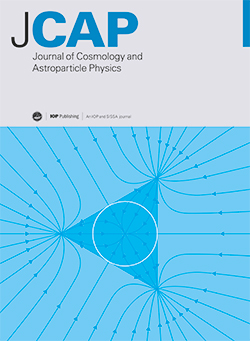通用多重性函数:计算光环和空洞
IF 5.3
2区 物理与天体物理
Q1 ASTRONOMY & ASTROPHYSICS
Journal of Cosmology and Astroparticle Physics
Pub Date : 2024-10-23
DOI:10.1088/1475-7516/2024/10/079
引用次数: 0
摘要
我们提出了拉格朗日空间中游离集方法与峰值理论形式主义的新组合,并对大尺度范围内的光环和空洞统计进行了精确预测。这种设置基于一个有效的移动壁垒。除了推导出相应的数值多重性函数之外,我们还引入了一个新的解析公式,该公式与通过蒙特卡洛求实得到的精确数值解在小尺度(∼ 1012h-1M⊙)上达到了百分之百的一致。在空洞情况下,我们通过与 DEMNUni 模拟中测得的拉格朗日空洞尺寸函数进行比较,得出了有效移动壁垒对空洞形成阈值 δv 的依赖关系。我们讨论了光环和空洞从拉格朗日空间到欧拉空间的映射;采用球对称近似,我们在中尺度和大尺度上获得了很好的一致性。最后,利用有效移动壁垒,我们得出了与宇宙学模拟测量结果精确匹配的拉格朗日空隙密度剖面,这是利用下一代星系巡天利用空隙剖面进行精确宇宙学研究的一项重大成就。本文章由计算机程序翻译,如有差异,请以英文原文为准。
The universal multiplicity function: counting haloes and voids
We present a novel combination of the excursion-set approach with the peak theory formalism in Lagrangian space and provide accurate predictions for halo and void statistics over a wide range of scales. The set-up is based on an effective moving barrier. Besides deriving the corresponding numerical multiplicity function, we introduce a new analytical formula reaching the percent level agreement with the exact numerical solution obtained via Monte Carlo realisations down to small scales, ∼ 1012h-1M⊙. In the void case, we derive the dependence of the effective moving barrier on the void formation threshold, δv, by comparison against the Lagrangian void size function measured in the DEMNUni simulations. We discuss the mapping from Lagrangian to Eulerian space for both haloes and voids; adopting the spherical symmetry approximation, we obtain a strong agreement at intermediate and large scales. Finally, using the effective moving barrier, we derive Lagrangian void density profiles accurately matching measurements from cosmological simulations, a major achievement towards using void profiles for precision cosmology with the next generation of galaxy surveys.
求助全文
通过发布文献求助,成功后即可免费获取论文全文。
去求助
来源期刊

Journal of Cosmology and Astroparticle Physics
地学天文-天文与天体物理
CiteScore
10.20
自引率
23.40%
发文量
632
审稿时长
1 months
期刊介绍:
Journal of Cosmology and Astroparticle Physics (JCAP) encompasses theoretical, observational and experimental areas as well as computation and simulation. The journal covers the latest developments in the theory of all fundamental interactions and their cosmological implications (e.g. M-theory and cosmology, brane cosmology). JCAP''s coverage also includes topics such as formation, dynamics and clustering of galaxies, pre-galactic star formation, x-ray astronomy, radio astronomy, gravitational lensing, active galactic nuclei, intergalactic and interstellar matter.
 求助内容:
求助内容: 应助结果提醒方式:
应助结果提醒方式:


